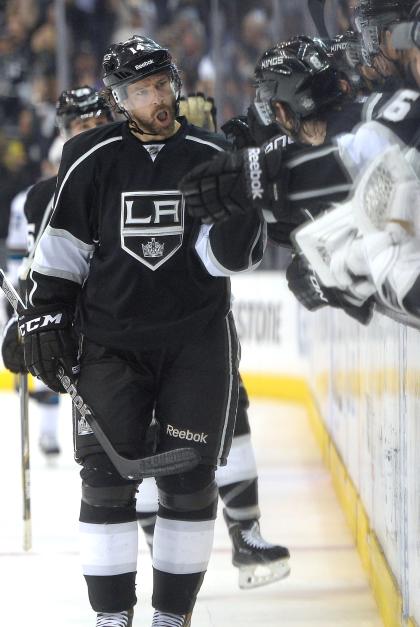Justin Williams' clutch performance for the L.A. Kings is rewarded with Stanley Cup MVP honor

LOS ANGELES – He received the Conn Smythe Trophy as the playoffs’ most valuable player, and almost immediately he handed it to someone else. He stood there, holding back tears. On that thing are names like Jean Beliveau and Bobby Orr, Ken Dryden and Bernie Parent, Mark Messier and Wayne Gretzky, Mario Lemieux and Patrick Roy, Joe Sakic and Steve Yzerman.
And now the engraver would add Justin Williams, a guy from a little town with an ordinary name who became a legend in his own right with the Los Angeles Kings.
“I can’t believe I won that,” Williams said later. “That will I don’t think ever, ever sink in.”
Just before he went to receive the Stanley Cup for the second time in three years, as Staples Center roared around them, Kings captain Dustin Brown looked into Williams’ eyes. He had something simple to say: “I love you.”

It was more than a delirious I-love-you-man moment. The love has been a long time coming for Williams, who has been an excellent player for years, started to get his due because of the rise of new-school statistics and then won the Conn Smythe for an old-school trait – clutch scoring.
Williams had nine goals and 25 points in the playoffs. His first two goals came in Game 4 of the first round, when the Kings began their comeback from a 3-0 series deficit against the San Jose Sharks – only the fourth such comeback in NHL history. He had five goals and 12 points in 10 games when the Kings were in Games 5, 6 and 7 of a series – including two goals and five points in three Game 7s.
That’s why they call him Mr. Game 7. He is 7-0 in Game 7s in his career, with seven goals (tied for the NHL record) and 14 points (an NHL record). Mr. Game 7 was pretty important for the first team ever to win three seven-game series on the way to the Cup final.
“Justin is the most underrated player in our team by a mile,” said Kings defenseman Drew Doughty after Williams scored in overtime in Game 1 of the Cup final. “He doesn’t get enough credit for what he does. There are two guys on this team that I want to give the puck to, and that’s him and [first-line center Anze Kopitar]. When they have the puck, things happen.”
Williams has ranked as one of the NHL’s best possession players since analysts started tracking Corsi (shot attempts) and Fenwick (unblocked shot attempts) in recent years. When he was on the ice 5-on-5 during the 2013-14 regular season, for example, the Kings had 60.6 percent of the shot attempts. That was the fourth-best rate for any player in the league.
That doesn’t mean much to Williams himself. He said recently that a member of the Kings’ staff printed out some advanced stats at some point during the season and posted them for the players to see, but “it was tough to understand all those numbers,” and “we’re in a results-based league,” and “it kind of fizzled out.” (The Kings declined a request to interview members of the staff.)
“It seems like everybody’s talking Corsi, Corsi, Corsi,” said Williams, a 32-year-old who has played 13 NHL seasons. “I don’t know if it’s just the past few years that I’ve been successful at it, or was it 10 years ago I was good at it? I don’t know. … You certainly don’t look at the game, ‘Well, my Corsi rating was decent today, so I might not have played too bad.’ ”
But here’s the thing: Those numbers aren’t front-of-mind for players and don’t need to be. They are big-picture data for GMs, coaches and analysts to build teams, design strategies and break down the game, if they are used at all. Players worry about the small picture, kind of like how Kings coach Darryl Sutter doesn’t tell his players what matchups he is trying to get during a game. He just tells them what to do, and they do it. “You go out there a few times in a row, you’re like, ‘All right, maybe he’s trying to play this,’ ” Williams.
[SLIDESHOW: Stanley Cup Celebrations]
It’s a good bet Williams was good at this 10 years ago – and even long before that – or at least had the skill set to be good at it in the right situation. The kid who came from little Cobourg, Ontario, and was cut three or four times growing up eventually became good enough in junior that the Philadelphia Flyers drafted him in the first round. In 2005-06, he had 31 goals and 76 points in the regular season for the Carolina Hurricanes, then put up seven and 18 more and won the Cup. He followed that with a 33-goal, 67-point season.
Kings GM Dean Lombardi landed him in a trade in 2008-09 after he suffered through two injury-plagued seasons. What did he see? “The same guy I saw when he was in junior hockey,” he said. “This kid has got a little rebel in him, but those guys rise to the occasion. He’s a special, special human being.”
Williams plays a possession game, and his skills come out on an elite possession team – right system, right teammates. If he has the puck, he doesn’t give it away needlessly. When he doesn’t have the puck, he gets it back. He’s great along the wall. That’s where the intangibles – heart, character – can show up in the numbers.
“If a play’s not there, then I’ll move around, do some cutbacks and see if another play opens up,” Williams said. “You don’t want to give the puck up and give possession to the other team if you don’t have to. Board battles are a lot to do with determination, a lot to do with smarts, a lot to do with grittiness. I think [the rule changes since 2005-06 have] helped, too. You can’t get somebody and wrap them up anymore.

“It’s something that I feel is extremely important. I’m not a guy who’s going to shoot a puck from inside the blue line and score. I have a good shot. I certainly don’t have the release that a lot of guys have in this league. I try to do a lot of things well because I don’t have that single thing that sets me apart from anyone else.”
Well, actually he does have that single thing that sets him apart.
Some people hate that word, clutch, because they think when a player comes through in big moments, it’s because he’s a good player (and maybe because of luck), not because of some special quality. They think it’s a false narrative.
They have a point. More often than not, a player comes through because he’s good first and foremost. Luck can play a role. Narratives can be outright false or just exaggerated. Clutch can be overused.
But it can be just as wrong to underplay the human element of this game. Players play with emotion and nervous energy, especially in the playoffs, especially with a series on the line. Some players thrive while others don’t in those situations, wanting to make a play instead of trying to get through the shift without making a mistake. The more they do it, the more their confidence grows.
Williams was all over the ice in these playoffs. He was all over the ice Friday night. It was no accident he swiped in a rebound to open the scoring and had multiple scoring chances after that, and it was no accident he claimed the Conn Smythe – over other deserving candidates like Doughty, Kopitar, Marian Gaborik and Jeff Carter. He’s good, and he’s clutch. He’s the MVP of the playoffs.
His name will look just fine on that trophy.

